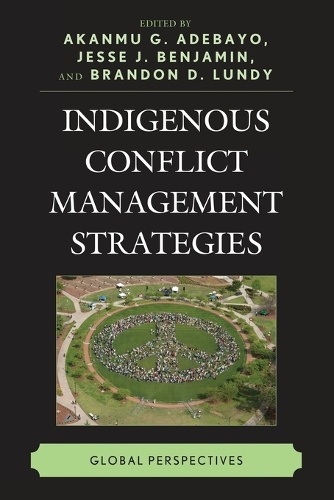
Indigenous Conflict Management Strategies: Global Perspectives
(Paperback)
Publishing Details
Indigenous Conflict Management Strategies: Global Perspectives
By (Author) Akanmu G. Adebayo
Edited by Jesse J. Benjamin
Edited by Brandon D. Lundy
Contributions by Joseph Kingsley Adjei
Contributions by Haluk Baran Bingol
Contributions by Fabiola Crdova
Contributions by Vanessa Currie
Contributions by Kwaku Danso
Contributions by Jessica Dickson
Contributions by Ali Gohar
Bloomsbury Publishing PLC
Lexington Books
14th November 2016
United States
Classifications
Professional and Scholarly
Non Fiction
Peace studies and conflict resolution
305.8
Physical Properties
Paperback
328
Width 151mm, Height 230mm, Spine 22mm
467g
Description
We know that since the end of the Cold War, conflicts in non-Western countries have been frequent, frequently violent, largely intra-state, and protracted. But what do we know about conflict management and resolution strategies in these societies Have the dominant Western approaches been transplantable, suitable, effective, durable, and sustainable Would conflicts in non-Western societies be better handled by the adaptation and adoption of customary, traditional, or localized mechanisms of mitigation These and similar questions have engaged the attention of scholars and policy-makers. Indigenous Conflict Management Strategies: Global Perspectives is offered as a global compendium on indigenous conflict management strategies. It presents diverse perspectives on the subject. Fully aware of the tendency in the literature to over-generalize, over-romanticize, and over-criticize the localized and customary mechanisms, the book takes a slightly different approach. It presents a variety of traditional conflict management approaches as well as several cases of the successful integration of the indigenous and Western strategies in the contemporary period. The main features, strengths, challenges, and weaknesses of a multitude of indigenous systems are also presented.
Reviews
This book convincingly stimulates a wider and deeper engagement with indigenous conflict management strategies in a world that has blinded many to the potency of non-Western traditions of conflict resolution, reconciliation, and peacebuilding. It is a welcome and essential resource for scholars and students of politics, culture, and conflict transformation who appreciate the relevance of culture and tradition as essential ingredients of peace, amity, friendship, and global understanding. -- Olutayo C. Adesina, University of Ibadan
This compendium successfully integrates indigenous and Western strategies of conflict management and peace building...a topic of great urgency to our generation as we rebuild that elusive bridge to the future we desire. The book's global examples should read as freshly and remain as relevant to our grand children as it does to us. -- Chapurukha M. Kusimba, American University
Indigenous processes of peacemaking, dismissed as irrelevant and backward tribal rituals for the last five centuries by the state based legal system, and neglected by the newly emerging field of Alternative Dispute Resolution (ADR), at long last have begun to gain the attention of a few scholars. The publication of this book elevates the currently fledging scholarship on this critical subject to a much higher level. This book is the first comprehensive volume on the subject of indigenous processes of peacemaking. As such, it will serve as a pioneering piece of scholarly work for years to come. Its scope is comprehensive, its analytical approaches are deep, and it employs interdisciplinary perspectives. It is a must read for those who are interested in this important subject. -- Hamdesa Tuso, University of Manitoba
Author Bio
Akanmu G. Adebayo is professor of history and director of the Center for Conflict Management at Kennesaw State University. Jesse J. Benjamin is professor in the Department of Sociology and Criminal Justice and the Department of Interdisciplinary Studies at Kennesaw State University. Brandon D. Lundy is assistant professor of anthropology and interim associate director of the PhD Program in International Conflict Management at Kennesaw State University.
